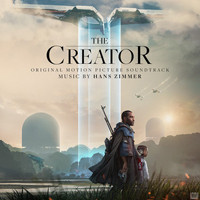AI is all the rage at the moment, with high-profile strikes through Hollywood from people afraid of their jobs being taken away, and kids around the world asking ChatGPT to do their homework for them, so Gareth Edwards’s new film about mankind’s battle with increasingly-omniscient AI in the distant future is very timely. I speak from personal experience of having spent about 7.5% of the whole of 2014 trying to set up my wireless printer that in the battle between man and machine there is only likely to be one winner.
In the film, the original score has to fight for space with various songs, so the first thing to note is how effective its narrative journey is when it’s heard on the album, which at just over 40 minutes is refreshingly brief for a 2023 film score. This is pretty impressive – it can be the case that scores that find themselves interwoven between prominent songs end up just sounding like filler. The Creator most emphatically does not. While there are no big themes that you’ll be humming afterwards, there is some interesting thematic development and certainly no shortage of “big” everything else.

The main theme is introduced in the opening cue, “They’re Not People”, where it has a somewhat subdued air but effectively paints its picture of the future; it’s a few cues later, in “She’s Not Real”, that its real intentions are first revealed, as its rising phrases are set against descending counterpoint in the arrangement which provides a subtle but powerful contrast that really gets to the heart of things.
The second cue really made me sit up and take notice, because “A Place in the Sky” is distinctly reminiscent of Beyond Rangoon, one of its composer’s finest efforts but one written in a style he has rarely revisited. The exotic electronic rhythmic momentum is really compelling and I’m really pleased to hear it again. A clever variant on the main theme dominates “Where It All Began”.
The album’s first third or so offers what I think is an intriguing set-up and then the fireworks really begin in the lengthy “Standby”, a cue of considerable might as those rising phrases of the main theme are heard for the first time on powerful brass; as the strings swirl around and the horn solo begins midway through the cue, it’s mesmerising – when the choir joins in, even moreso. It doesn’t last all the way through the cue’s six minutes though – things get a lot tenser towards the end, with some compelling percussion joining in to ratchet things up a notch.
“Missile Launch” takes us back to Interstellar – superficially because it features an organ solo, though it’s rather different from the earlier score’s – more pertinently because of its driving sense of momentum, the way central ostinato keeps up the pace as orchestral fireworks start kicking off around it. It’s a huge cue whose power is greater because it feels like the natural conclusion of the album’s first half – this isn’t cheap, unearned power, it’s the product of what has gone before and that is impressive.
The momentum never really lets up after that. “Prayer” begins with beautiful, heavenly choir before the organ is heard again to add colour; then “The Wounded” marks the score’s emotional low-point with a sparse, largely electronic soundscape proving quite powerful at expressing sadness and loss. “Lab Raid” is the album’s only real action music (though there’s a bit more in the film) – it’s by no means weak but possibly the least interesting element of the score, its grandstanding feeling a little rote, however it’s certainly effective at doing what it needs to.
The lengthy “Heaven” opens in much more contemplative fashion, the meditative sounds of Beyond Rangoon again being brought to mind. A couple of minutes in, its slightly tortured atmosphere begins to resolve itself into something much more beautiful, and I love the keyboard sounds that then bring some energy while not losing the sense of calm. Then we come to the apotheosis, the emotional payoff the whole thing has been building towards, in “True Love” – the art of holding something back in a film score in order to unleash it later on has been a natural casualty of the need to keep people’s attention in a society with so many distractions and it’s great to hear it here. If I say its level of emotional manipulation reaches almost corny proportions then I really don’t mean it as an insult – this is the sort of thing film music is supposed to do and as the orchestra swells, then the choir joins in – all feels pretty much right in the world.
What I like most about The Creator is that it feels like it’s ticking off everything that it needs to do without ever descending into bluster or relying on gimmicks. It’s a straightforward dramatic film score which does what a good dramatic film score should do – adds to the film and when it goes big on emotion it’s really earned the right to do so. There’s been no big PR tour for this one, no statements about how it doesn’t sound like anything that’s gone before, and so on – and that avoidance of creating unrealistic expectations has undoubtedly also helped its cause. Fundamentally though it’s just good music and that’s what will make it a real keeper.












Completely agree. Movie and score worked very well together, and they were both effective without being showy or weak. Hans Zimmer operating at exactly the right level.
First review so far, thank you